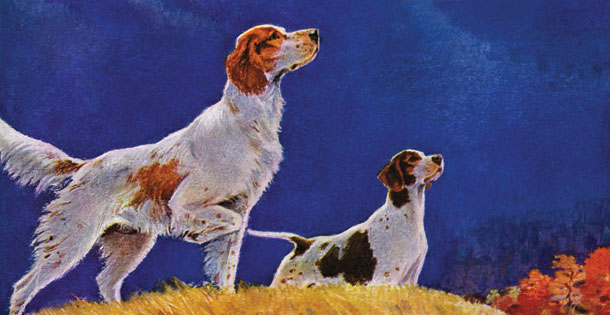Wayne was in and out of the feed store in less than 10 minutes. Hector and the others had walked across the road to Piggly Wiggly, and once Wayne had his sacks of scratch he drove there to wait for them. It was warmer now than it had been over the weekend, as if winter was having second thoughts about coming after all. The sky was cloudless and blue and beautiful.
The Mexicans came out carrying plastic grocery bags and three cases of beer. They climbed into the bed of the truck without a word. Hector was lagging behind them, two bags in each hand, and Wayne called out to him. “There’s room inside the cab for you,” he said. “Hop in.”
“OK,” said Hector. “It is really OK?”
“Sure,” said Wayne. “You’re too old to be riding back there. You and me both.”
Hector looked back at the others and shrugged, then came around and got into the cab with Wayne. Three of the plastic bags were situated between his feet, and Hector began searching through them as if checking his inventory. One of the bags held several bouquets of assorted flowers, and in another Wayne could make out a bottle of cheap tequila — that and a carton of cigarettes, two loaves of bread and a mesh sack of oranges, a few big bars of Hershey’s chocolate. A fourth bag sat on the bench seat between Wayne and Hector. It appeared to hold nothing but white utility candles, box after box of them.
Once they were on the highway Wayne tried to make conversation. “Y’all throwing down tonight?” he asked.
Hector gave him a confused look, so Wayne made a little drinking motion with his hand.
“Fiesta?” he asked.
“Ah,” said Hector, understanding. “No, no, señor. It is not for us.”
Hector didn’t offer more, and Wayne didn’t push. They passed the high school and then the practice field. Classes had let out, and the football team was already out there stretching. It was late in the season, and the grass field was mostly dirt now. Bo Gibson was weaving his way through the rows of sprawled-out teenagers, twirling his whistle as they went through the motions. Homer would be playing Pass Christian High on Friday, the Pirates, and someone — an assistant coach, Wayne figured — was sporting an eye patch and a black hat, and waving a plastic sword. Wayne was searching for Justin but couldn’t find him. He searched for as long as he could, then swerved back onto the road when his tires slipped off the blacktop.
Wayne had been home for an hour or so when there was a knock at the door. He’d fallen asleep watching the five o’clock news and wasn’t in the mood to be disturbed. From the window in the living room he could see a red Dodge Neon parked next to his truck, and his only guess was that someone was hoping to sell him something.
When Wayne opened the door there was a black man standing there, and though Wayne didn’t recognize him, he knew without knowing that this must be Louis Carpenter.
“Hey there, All-District,” said the man.
“Louis?”
“That’s right. How you been, Wayne?”
Louis Carpenter was fat now. Obese, really. Heavy around the waist and shaped like a pear. He was wearing khaki pants and a white golf shirt. Wayne shook his hand but didn’t invite him inside. Instead they just stood there on the porch together out in the cold, two gray-haired men who once knew each other as boys. The sky was tinted red. It would be dark soon.
“Thought I’d come out here and see you,” said Louis. “I guess you already have a handle on what this is about, hey?”
“Where you living these days?” Wayne asked. “You must’ve moved away, yeah?”
Louis nodded. “Cincinnati. I’ve been up there close to 30 years. I sell insurance, nothing special. You stayed put?”
“I stayed put.”
The cell phone on Louis’ belt began to chime, and he silenced it without ever taking his eyes off Wayne. “Bo thinks it’d help out the team if you were there tomorrow.”
“Seems strange,” said Wayne.
“Maybe.”
“What do we got to do with them?”
“Search me. But he cared enough to fly me down. Paid for it out of his own pocket, I think. Says he’s trying to build something special down here. Says he hopes to make men out of those kids.”
“Football coach bullshit.”
Louis laughed. “He’s like an Eagle Scout, that boy.”
“So he pays to fly you down and then asks me?”
“Well, truth is, maybe that was more my idea, asking you. You were good to me back then.”
“You think?”
“You stuck around. Best player. Team captain. That there’s something.”
Wayne looked away. “I’m not much on giving speeches, Louis.”
“He’s not looking for us to make any speeches.”
“No?”
“He just wants us to meet the team. I think they’ve had some trouble this year — you know, getting along.”
“I haven’t heard anything about that.”
“What he said.”
“You want to come inside?”
Louis shook his head. “I’ll leave you be. Just figured I’d say hello, make my pitch.”
Wayne started to speak but then stopped. Justin was coming down the road in his truck, and Wayne stood there with Louis, watching his grandson come on. It was early, and Wayne figured Gibson must have cut practice short for Halloween. The boy parked and walked up the steps, his book bag slung over his shoulder. He was limping a little bit, sore from some hit, and giving Louis a shy look. For such a big kid at times he seemed without presence in the world at all, as if he thought he could carry himself a certain way and avoid ever being noticed. Even now he looked like he was planning to just slink on inside, wordless, and so Wayne touched him on the elbow to whoa him.
“Say hi to Mr. Louis Carpenter,” Wayne told him. “We used to play ball together.”
Louis was smiling. “Real nice to meet you, son.”
“Yessir,” said Justin, and when Louis offered his hand he shook it.
“Man, your grandpa sure was a helmet knocker.”
Justin nodded but was looking at Wayne. He seemed to understand what this visitor on the porch might mean, and Wayne shrugged at him, an apology of sorts for what was going to happen tomorrow.
“You’re a quiet one,” said Louis.
“Teenagers,” said Wayne, speaking as if Justin weren’t still standing there beside him. “It’s like living with a hungry shadow sometimes.”
Become a Saturday Evening Post member and enjoy unlimited access. Subscribe now




Comments
H. V. Stephen Larsson
What a joy to read actual quality lit, to read a real literary short story, a piece within which each element contrives to accentuate the whole—one of the more obvious examples being the psychology of dogs to provide insight into the protagonists awareness, which would obviously spill over into his awareness of human beings. What a setup, what a good opening, a real exposition. This story is packed with such pregnancies of thought, each strengthening the whole. As with any fine art, it takes a couple of good perceivings; in this case, readings, to catch all the nuances so they naturally combine to create an aesthetic depth of awareness. And the subject matter, published when police versus minority relations, fanned to flame by media, is so strongly in our consciousness, shows courage on the part of The Saturday Evening Post. An aging, southern, rural white man, pressured into giving false testimony for the new attitudes of upcoming generations, pressured into espousing attitudes he neither believes in or cares about, is, at this time, a powerful subject to develop literarily. Plus, what a wonderful ending. The discerning reader is left hanging with the thought of what they would say in a few minutes, in this tense, untenable situation, if they were the protagonist who is stuck in it. My thanks to Skip Horack and this publication.
Don’t you people ever provide a piece of fiction (“The Day of the Dead”) that includes some sort of conclusion? It seems like such a waste of time reading through a story that leaves the reader up in the air. I realize your readership is older, but I think they have enough time left to read and appreciate a reasonable denouement before they kick the bucket.
I receive the paper copy of the Saturday Evening Post and was reading the short story by Skip Horack. What happened to the story’s ending? I’m missing pages 88 and 89 of my latest paper edition and the story’s ending is also missing from the internet version. What gives??